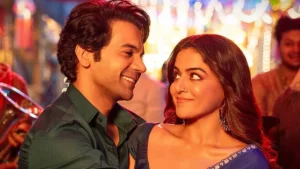
Commercial Hindi cinema has its weird ways of functioning. All it needs is a trend to follow and a poster boy/girl to piggyback on. It does not matter if Kartik Aaryan can flex a sum total of three muscles on his face. It does not matter that he delivers his lines as if there’s an aubergine stuck in his mouth. It does not matter that an aluminum vessel boasts of a better presence sharing screen space with him. What matters is the packaging – albeit substandard writing – and a face like his, which is known to represent a certain band of Bollywood cinema. Director Laxman Utekar’s Luka Chuppi is wannabe progressive and lowers the standards of the comic sub-genre it belongs to and also Hindi cinema in a collective sense.
A romantic comedy, the film follows the path of two youngsters who seem to be alarmed by the idea of live-in relationships as is half of India’s uninformed youth. Unlike the leads in the 2005 film Salaam Namaste, Guddu (Aaryan) and Rashmi (Kriti Sanon) in Luka Chuppi get no concrete reason why they would want to try this arrangement out. The small-town setting is perfect if one must ask. It is filled with intrusive people, rigid traditions, politicians doing their bit of bait, and severe communal and caste divides. Consciously or otherwise, Luka Chuppi only normalizes several of these vices.
For instance, Aparshakti Khurrana plays Abbas, a Muslim sidekick to the hero. The screenplay design is such that an unassuming viewer identifies him only as a follower of Islam. His ornamental role in helping lovers is secondary. There is also a Muslim superstar (Abhinav Shukla) whose posters are torn and films are banned in the whole of Uttar Pradesh. Why? Because he is in a live-in relationship and openly admits it. On the other hand, Utekar’s film also aspires to bear progressive skin and pretends as if it is remedial. He throws in a classic Kartik Aaryan sermon in the finale and everything stands magically resolved. Unfortunately, things aren’t as simplistic even seen through the lens of a lame Bollywood comedy.
There is more to Luka Chuppi and its misplaced progressiveness. At one point, we see a woman struggling behind her ghoonghat (traditional Indian veil). Post the hero’s evocative climactic speech, you see her shed the same. The saree’s pallu is a couple of inches above her forehead and, according to the film, she has achieved empowerment. Rashmi’s mother-in-law (Alka Amin), who is not filthy rich, is shown to be unimaginably broadminded. Here we can clearly picture how the writers are drawing parallels between the rich and poor, with the latter being kinder, evolved, and all things wise. While trying to project live-in relationships as something socially acceptable, the film leaves no stone unturned in keeping its casteist demeanor untouched. “He is from a Brahmin family,” Rashmi’s father refers to his son-in-law at least twice in the film.
On the brighter side, Luka Chuppi comes with a couple of winsome supporting characters whose gags, even though repetitive, induce a couple of laughs. One is Guddu’s unmarried elder brother (Himanshu Kohli) who is forever exasperated about his younger brother’s luck with women. Guddu’s nephew is another charming character who milks his uncle monetarily in order to keep a dreaded secret from spreading.
Pankaj Tripathi does an inferior spin-off of what Sunil Grover did it Pataakha. The actor delivers the goods but the character is thoroughly unappealing. Kartik Aaryan is wooden throughout whereas Kriti Sanon somewhat gets the beat of the film. Aparshakti Khurrana and Alka Amin perform their parts to the best of their abilities while Vinay Pathak hams in a shoddy cardboard character. Sapna Sand as the intrusive neighbor is quite a scene stealer as she seems to be making full use of that one golden opportunity on the big screen.
One of the laziest prototypes in the convenient social comedy subgenre that it represents, Luka Chuppi is blissfully unaware of its so-called golden intents going awry. It does attempt to project small-town sensibilities but seldom owns up to its backdrop except for a series of recurrent aerial establishing shots. The only marginally funny passage in the film is the samooh vivah (community wedding) sequence in the pre-climax which comes crashing to a drastic thud when the leading man begins his diluted rant to deliver an essential social message. Quite evidently, Luka Chuppi is solid proof that ‘Bareilly’ and ‘Barfi’ could not have made Bareilly ki Barfi what it is. Likewise, Kartik Aaryan, Kriti Sanon, Central India, and a bunch of character artists who get the small-town syntax bang on can barely deliver a half-decent social comedy.
Rating: ★ 1/2 (One and half out of 5)
Lukka Chuppi is now streaming on Netflix.

